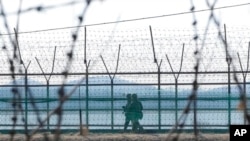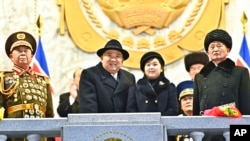North Korea warned Friday of an unprecedented response if the United States and South Korea go ahead with planned joint military exercises, which have recently ramped up in response to North Korean weapons tests.
In comments published by the state-run Korean Central News Agency, North Korea’s foreign ministry predicted the Korean Peninsula “will again be plunged into the grave vortex of escalating tension” if the U.S.-South Korea drills go ahead.
“In case the U.S. and south Korea carry into practice their already-announced plan for military drills … they will face unprecedentedly persistent and strong counteractions,” the statement said.
Earlier Friday, South Korea’s military announced it will hold a “tabletop” exercise at the Pentagon on Wednesday that will simulate a North Korean nuclear attack.
The discussion-based drill will be followed by a visit to a U.S. Navy base in the southeastern U.S. state of Georgia that hosts key U.S. nuclear submarines, added Seoul’s defense ministry.
The drill is meant to give South Korean officials a better understanding of how their U.S. ally would respond to hypothetical North Korean nuclear attacks.
South Korean officials, including President Yoon Suk Yeol, have expressed doubts about the effectiveness of the U.S. defense commitment to South Korea.
In an effort to assure South Korea, U.S. Defense Secretary Lloyd Austin last month vowed increased displays of military strength – including the deployment of U.S. “strategic assets,” which include long-range bombers, nuclear-capable airplanes, and aircraft carrier strike groups.
Later this year, South Korea and the United States are considering holding their first large-scale, live fire exercise in about six years, South Korean defense officials have said.
Such drills were paused starting in 2018 when the United States and South Korea pursued negotiations with Pyongyang. North Korea, which was unhappy with U.S. demands, walked away from the talks in 2019 and a short time later resumed major weapons tests.
Last year, North Korea launched at least 95 missiles, by far a record high. Some of the missiles prompted air raid alerts and shelter warnings in South Korea and Japan.
The North is also believed to be preparing more major provocations, including another nuclear test and the launch of a military satellite.
At a military parade last week, North Korea displayed more intercontinental ballistic missiles than ever before. The parade also provided more signs Pyongyang is working on a solid-fuel ICBM, which can be launched much more quickly than the country’s current liquid-fueled versions.
North Korea is prohibited from any ballistic missile activity under a series of United Nations Security Council resolutions.
The United States has tried to get the Security Council to pass additional measures following the North’s recent tests. However, China and Russia – North Korea’s biggest international backers, who both wield vetoes at the U.N. body – have prevented such efforts.
In its statement Friday, North Korea’s foreign ministry accused Washington of trying to use the Security Council as a “tool for the U.S. unilateral pressure” against North Korea, which is officially known as the Democratic People’s Republic of Korea, or the DPRK.
The statement claimed the DPRK has recently refrained from “any special military action,” except those regularly scheduled activities meant to bolster its national defense.
But if the U.N. Security Council “continues to be inveigled by the U.S. as the latter wishes, the DPRK will be compelled to reconsider measures for additional actions, to say nothing of the category of normal military activities,” it warned.





